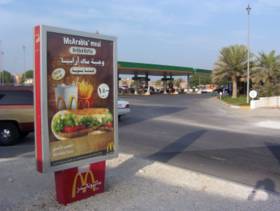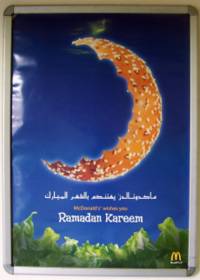Glocalization
Friday, November 05, 2004
Have a look at the photo above. Looks pretty normal, yeah? Just a regular McDonald's advertisement for a Big Mac. Well have a closer look:

Yes, the advertisement is not for a Big Mac, but for a relatively new sandwich being marketed by McDonald's in the region called the "McArabia". The McDonald's Arabia website describes the McArabia as follows:
McDonald's GCC has just added a new sandwich to its well-loved menu: the McArabia Grilled Kofta; another fuit of customers' demands for a sandwich that is rich in local taste. The new sandwich is made of two patties of grilled Kofta dressed with tahina sauce, lettuce, tomatoes and onions, all wrapped in Arabic bread.
Hilarious.
I've posted stuff before about globalization in Bahrain (1, 2, 3) in which we see symbols of foreign and local culture clashing with each other. But the McArabia sandwich pictured above illustrates a slightly different (yet related) phenomenon. The term "glocalization" was originally coined in Japan, but was made popular by the reknowned sociologist Roland Robertson. He explains:
"Glocalization" means the simultaneity --- the co-presence --- of both universalizing and particularizing tendencies. (Continued)
In the example above, it would refer to the way McDonald's, a global corporation, has made an attempt to adapt itself to suit the unique local market conditions of Bahrain. So the arrow is working in both directions: (i) McDonald's is globalizing Bahrain, and (ii) Bahrain is "localizing" McDonald's -- thus, "glocalization". There's a lot more theory to go along with this idea, but that is it in a dumbed down nutshell.
And this glocalization produces quite funny results. For one thing, just have look at that sandwich! I laugh everytime I look at it. But also notice in the advertisement how its name is written in Arabic. They've chosen to to use a transliteration of the English word "Arabia" rendering it as: أرابيا, as opposed to maybe using the Arabic word عربية. Interesting. And then have a look in the bottom left of the corner where it says "Authentic Taste". What the hell does that mean?? What does an "authentic" McArabia taste like? I guess they want us to believe that it has an authentically local taste (hence McArabia), maybe comparing it to a shawarma or something. I haven't tried one (and I don't intend to) so if any of you know how it tastes then let us know.
Although I like cursing at McDonald's, just as much as anyone else, for spoiling local cuisines around the world, in honesty I don't think its effect on Bahrain has been at all bad. It has provided us with the option of buying shitty and unhealthy food when we are in a real hurry, and that can be extremely useful at times. And it hasn't hurt the local food business at all, because burgers and shawarmas are not really substitutes for each other. If anything, the arrival of McDonald's in Bahrain has probably increased the sales of shawarmas because it's made people realize how much better shawarmas are compared to most other foods (which I'm sure ShawarmaBoy will testify to).
Let me leave you with another McDonald's advertisement illustrating this glocalization:

Cheeky
0 Responses to 'Glocalization'
Leave a Reply:
» To leave new comments, please go to the new address of this page.